CING Inc. Their Praises
By Mento 0 Comments

Here's a piece I've been meaning to write for a long time. CING Inc. was a game developer that worked primarily on adventure games back during a dark period where the future of the genre was uncertain, years before Indie developers like Wadjet Eye and King Art Games would effectively revitalize point & clicks and others like Campo Santo, Fullbright and Love Conquers All Games would take games with a narrative-heavy focus in all sorts of new directions. Though CING only lasted eleven years (1999-2010) with nine games to their name - a handful of which were never released in North America, though we were fortunate enough to see them in Europe - they managed to carve a niche on the Nintendo DS and Wii that was distinct enough to stand out alongside the many other very special games on those systems.
CING originally began as a successor company to the sadly defunct Riverhill Soft, which in its time created the J.B. Harold Murder Club and the Todo Ryunosuke murder mystery franchises (and, uh, OverBlood). CING came into being as a subsidiary of contract developer giant TOSE - a company that regularly did work for outside publishers, the quality of which fluctuated wildly depending on the resources and time they were given by their patrons - and was left to their own devices, producing the games they wanted to make. That's where we get CING's eccentric output, which drew largely from Japanese adventure gaming but also took inspiration from a number of other sources. Though I've yet to play all the games they put out, the few I have left an indelible impression at a time when adventure game fans were generally out of luck.
I wanted to write about five CING games in particular, one of which I am presently playing for the first time. It's my fervent hope that their IPs end up with someone capable of breathing new life into them, or at least remastering them for a new audience to enjoy. (As for CING's other games: at this point their inaugural game Glass Rose might be too pricey to hunt down, Monster Rancher DS was a so-so variant of the original PS1 games without the fun "create monsters from CDs" feature, and the psychic FMV detective game Again was perhaps a bit too goofy for its own good.)
Another Code: Two Memories / Trace Memory (2005)
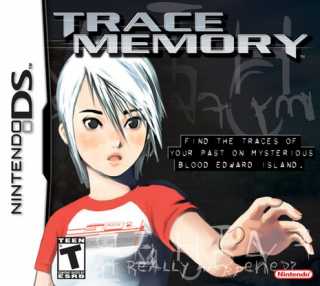
An adventure game explicitly designed to take advantage of the Nintendo DS and its features, Another Code beat Professor Layton to the punch by two years, not only designing puzzles that required a stylus to solve but finding gameplay applications of the new system's features that few had thought of yet. Ideas like closing the DS to solve a puzzle where you might need to leave an imprint by pressing an item to a surface, or using the DS microphone to blow air when required.
Another Code's story stars Ashley Mizuki Robbins, a precocious teen who is searching the mysterious Blood Edward Island for her missing scientist father. The plot takes a few twists and turns, introducing devices that can imprint new memories over old ones, a ghost who can only remember his initial "D", and the island's curse which involves the tragic and bizarre deaths of the wealthy Edward family it was named after. It was one of those cases where the narrative drive had to take frequent pauses for puzzles, and a lot of the information you could find was optional: in fact, it's your thoroughness in this regard that determines whether or not D would remember his true identity by the end of the game.
For me, Another Code came along at a time when I had recently bought a DS and wasn't yet sure about its place in the world. Nintendo had been having an interesting time throughout the early 00s, with concerns that the underperforming N64 and GameCube would mean an inevitable dismissal for one of gaming's oldest institutions, following Sega in leaving the hardware biz. Of course, it never pays to underestimate Nintendo, but I remember having the DS and just a few of the more gimmicky games that used its features - Pac-Pix and Yoshi: Touch & Go, neither of which had much of a hook past the first few minutes of drawing Pac-Men and directing eggs - and wondering if it would have the same kind of legs the GBA did. Even without the benefit of hindsight years later, the presence of Another Code and others like it to come would convince me that - if nothing else - you could make some crazy adventure games on this platform.
While the game was a little on the short side and a number of less compelling filler puzzles, it would exemplify CING's directive of creating narrative-rich experiences in formats that hadn't yet been done to death.
Hotel Dusk: Room 215 (2007)
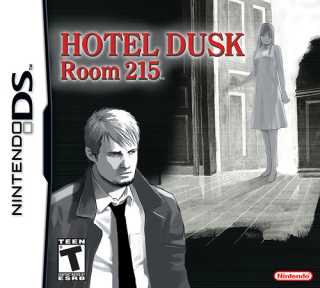
Hotel Dusk got closer to CING's Riverhill roots by its mixture of detective investigation puzzles with a compelling mystery narrative and characters you could enjoy spending time with. It concerns Kyle Hyde, a travelling salesman who had to abandon his previous life as a police detective to track down the whereabouts of his crooked partner, who he last saw in an altercation on a bridge after which he fell into the water and disappeared. He's drawn to Hotel Dusk and its mysteries after finding out that his former partner had stayed there recently, and starts to pull at a number of different threads while there.
What's amazing about the way Hotel Dusk was constructed is how much a lot of it was built around the "best" way to role-play the protagonist. Kyle's a preternaturally grumpy guy who is useless before his morning coffee and fond of spirits, who treats most people tersely especially if they get on his nerves. However, persevering with his cold, hard-boiled persona often serves to alienate key witnesses and drive them away, which leads to a premature game over as you no longer have the means to continue the plot. Kyle has to adjust his attitude to get what he needs from the guests of the titular establishment, navigating through dialogue without losing his cool or saying the wrong things. The game's puzzles are split between investigating locations and interrogating witnesses and suspects in a genial and non-judgmental way; the latter being something Kyle still needs to adjust to without the legal powers of his former profession.
Added to this is a whole lot of great noir writing and a distinctive visual style that renders the game's characters as talking sketchbook profiles with realistic rotoscoped animations, similar to Aha's "Take on Me" music video. Kyle's a wonderful construct: a downcast home appliances salesperson who enjoys his creature comforts and is only in his element when he's browbeating a suspicious type into spilling what they know. Watching him bounce off the game's rogue gallery of weirdos, losers, enigmas, and potential killers is where much of the game's enjoyment is derived, even if a conversation might not always go the way you'd hope.
Personally, Hotel Dusk fulfilled that early promise Another Code made of the DS being a perfect system for light reading and adventure game elements. In 2007, we'd also see the first Professor Layton game and the second Ace Attorney (or rather, the localized DS version, as the original GBA game was a lot older). I was getting used to the idea of picking up adventure games to be played on the go; something to wade into whenever I had a moment free while travelling and that could be immersive without necessarily drawing my absolute attention. Hotel Dusk is precisely that kind of game.
Another Code: R - A Journey into Lost Memories (2009)
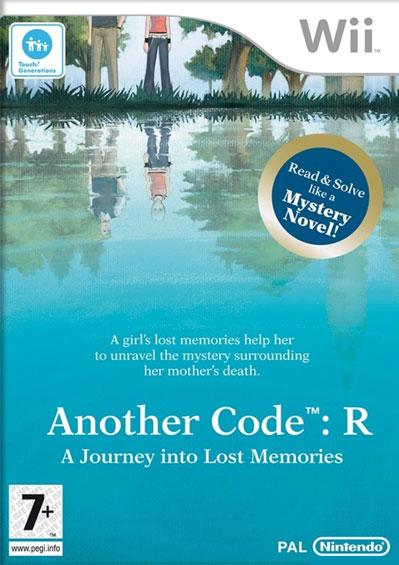
Another Code R once again follows Ashley Mizuki Robbins (the middle name is important, because she includes it every time she introduces herself - how else are people going to know she's half-Japanese?) as she attempts to chase her workaholic dad around Lake Juliet: a campsite and corporate retreat for the nearby JC Valley research company where her father works. Ashley's invited there to learn more about her mother; she gets flashbacks almost as soon as she arrives, and part of the game's overarching mystery is piecing these visions together to figure out what Sayoko Robbins was doing here so many years ago. She invariably gets caught up with a lot of the other concurrent stories around the camp, such as the 13-year old Matthew searching for his missing dad (which gives Ashley a sense of deja vu) and Ranger Dan looking for whomever burned down an old villa on the camp's outskirts.
Ashley's 16 now, and you can choose to play her as a stroppy and evasive teenager or someone a little more good-natured via regular binary decisions on how to respond to people. I've yet to determine if there's any major difference to these outcomes - it's beginning to feel a bit like Oxenfree with how often I've been given a choice of response with no feedback for any possible consequences that may occur - but at least lets you role-play your preferred version of Ashley. She's frequently aggravated by her absent father, who chooses to spend time away from her to complete his research into memories, and her first few moments at the camp are ruined by a mysterious thief who takes off with her bag (some of the early "missions" in game involving finding various items that were discarded from it - the thief clearly had a few specific items in mind), so you could justifiably play her as perennially PO'd.
What's curious about the game is that the scope is a lot larger, but the actual gameplay content has been greatly reduced. There's a few puzzles here and there, most notably when hacking the various electronic locks around the campsite, but for the most part you're scrolling through pages of dialogue and investigating locations for notes and other items of interest. It feels a lot closer to the Hotel Dusk/Kyle Hyde games as a result: the classic adventure game puzzles, though they're still here, take more of a backseat role to the story and atmosphere. When I say atmosphere, I mean in the most chill sense: the area of Lake Juliet is tranquil, and things tend to move very slowly even though you're investigating disappearances and other conspiracies. It has the vibe of a certain franchise in Japan called Boku no Natsuyasumi, in which you're a kid enjoying his summer holidays by catching bugs and going fishing and not doing much of anything while watching the clouds slowly cross the sky on an otherwise clear sunny day. There's always somewhere to go or someone to talk to to progress the story in Another Code R - at least as far into it as I am, since this is the CING game I'm playing for this blog - but the pace is languid and the dramatic twists are rarely all that urgent. A lot of the time, you're strolling across picturesque paths, occasionally tossing an empty can into a recycling machine for bubblegum machine tokens. It can make the game a little soporific in longer sessions, but I appreciate that it went to this much trouble to set a relaxing mood when most games take the opposite road.
Another Code R, like Another Code, really thought hard about how it could create puzzles using the unique capabilities of the Nintendo platform it was on, from the motion controls down to the Wii Remote layout. For instance, there's a recurring puzzle that requires you to input a series of buttons on the Remote: 1, 2, A, B, +, -, etc. At some point a 3 shows up. How to get a 3? Well, you can just type "1 + 2". It's simple enough, but I've spent so long accepting these weird-ass Wii buttons in abstract terms that I'd never put two and two together before, or one and two as the case may be. While the game has far fewer puzzles overall compared to its predecessor, the handful it does have work because they rely on mechanics only the Wii has (or had at the time, at least). Also, my favorite part of the game so far? The way the back of the case says "Basic reading ability is needed to fully enjoy this game." They're not kidding.
Little King's Story (2009)
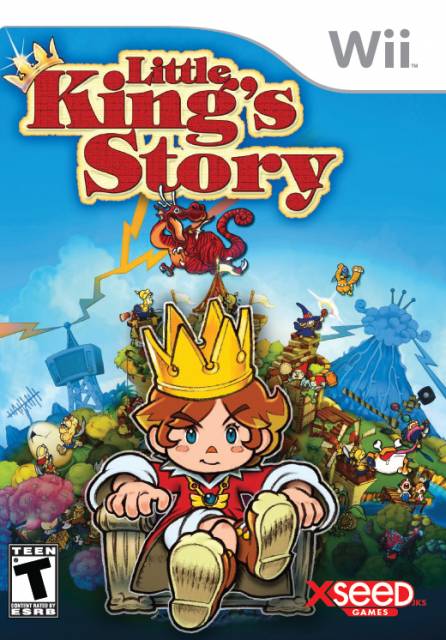
Little King's Story is an aberration even among CING's aberrations: a Pikmin-inspired group management puzzle game where you construct your own kingdom and take your loyal subjects with you to explore the world, find vital resources, and conquer the hostile bordering nations. In spite of this straightforward expansionist premise, the game maintains a certain level of whimsy and surrealism, pitting you against rival kings with bizarre designs and even stranger beliefs and machinations. From the outside looking in, it doesn't seem like the kind of game that would provide for a lot of rich narrative twists and turns, yet the game is full of memorable moments from both a story and gameplay standpoint.
Take, for instance, King T.V. Dinnah. A monarch with a CRT for a head, he built his kingdom around the wonders of televized media and the many types of programming it offers, with the appearance of his domain reflecting a mind addled by watching too much 20th century television. When you finally fight him as a boss, you need your retinue of farmers to dig up where he's hiding on a giant map of the world (our world, no less) while he throws out hints about the local landmarks like he's Carmen Sandiego. All the while, he keeps flipping from wartime dramas to cowboy movies to cooking shows, with elements of those shows manifesting as perils you have to avoid or defeat in the process - all this while a remix of Gershwin's Rhapsody in Blue plays (one of many public domain classical tracks borrowed for the game's grandiose soundtrack). Just this one fight alone, and its weird opening cutscene, encapsulates the mood for the rest of the game's idiosyncratic foes.
Most of the rest of the game involves building new constructs that provide new job classes for your loyal peons, who can then use these abilities to clear different types of obstacles and enemies in your way while exploring. As with Pikmin, there are a lot of beneficial items to find and carry back home, many of which provide new avenues for your king to check out. The core gameplay loop is fun enough, but it's really in those moments like King TV Dinnah's boss fight when you see the full breadth of the game's subversive lunacy that Little King's Story shines. Given how distinct it is from CING's more grounded adventure game work, it's hard to believe it came from the same developer. They evidently had a range to them; one they were sadly unable to exhibit more frequently.
In my view, Little King Story's was a fine replacement for Pikmin, which had gone on hiatus after Pikmin 2 for GameCube and would only be brought back on the Wii U, and typified the wonderfully odd games you would only see on Wii, and only if you looked hard enough past the usual Mario/Zelda/Smash Bros. suspects and the sheer mountains of shovelware. Xenoblade Chronicles, Deadly Creatures, Disaster: Day of Crisis, Elebits, Zack and Wiki: the system was replete with these types of offerings, but a lot of them were lost in the crowd. I'm grateful CING tried something outside their wheelhouse, adding to the Wii's cache of hidden gems in the process.
Last Window: The Secret of Cape West (2010)
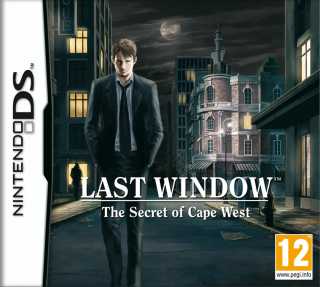
Last Window was CING's swansong, and a superior sequel to what had been their best game so far. We once again meet Kyle Hyde, who is in the process of getting evicted from his modest apartment digs, the titular Cape West, in 1980 LA. Actually, everyone in the building is vacating: the building is due to be demolished in a few months time for unknown reasons. Kyle is also fired from his salesman job at Red Crown, giving him plenty of free time to track down a mysterious "scarlet star" hidden somewhere within the apartment building and listening to his former neighbors for clues and their own stories.
Lake Window is a more confident sequel to Hotel Dusk, continuing that game's plot to some extent, and has performed several tweaks to make the gameplay that much better. There's no risk of losing progress if you screw up a dialogue scene with someone, and the game has a more intuitive UI. Cape West with all its hidden rooms and secrets makes for a more attractive location, and the plot feels overall more mature and suggests a certain amount of improvement from the game's writers. The low-key maturity in particular - something that, for all of Ace Attorney's strengths, isn't quite replicated in its procession of broadly silly characters and ridiculous court scenes - is a big highlight of the Kyle Hyde duology. The idea that you're consuming detective novels is made all that more pronounced by the way you hold the DS sideways like a book to play them.
Hotel Dusk felt a bit more like a pulp novella at times, which certainly isn't a bad thing if you're a fan of genre fiction and the familiar rhythms thereof. Last Window felt a lot more personal, conversely: much more of a character study and a statement on nostalgia and belonging. I felt for the tenants of Last Window more than the gaggle of broad archetypes in Hotel Dusk, and seeing Kyle Hyde's adventures come to their end was bittersweet in retrospect. Even if all he's doing is moving out of his apartment, it was a game about goodbyes that became all the more poignant following the end of CING.
It's a fine game to go out on, and it's only a shame it couldn't see a North American release. I'm thankful adventure games seem to do better in Europe - Germany's the home of King Art Games, and Spain is where we get the busy Pendulo Studios - which is probably what convinced CING's publishers to release Another Code R and Last Window over here. If you ever get the chance to try these games, or any of the other I've outlined above, I'd recommend doing so, especially if you're an adventure game fan like me who has been through some highs and lows from the mid-90s to now. If not, I hope I've made a strong enough case for why their games meant a great deal to me.

0 Comments